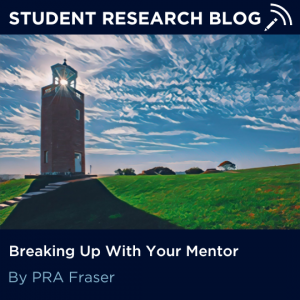By Fraser McGurk, Peer Research Ambassador
 What do you do when it’s time to move on?
What do you do when it’s time to move on?
The journey through the world of research is as unpredictable as it is exciting. There is never one clear cut way to find your passion through research, and often this requires a bit of trial and error. On some occasions, someone’s first research mentor fits their every need, and that is great! However, that’s not the case for everyone, and sometimes it’s better to expand your horizons. There are a variety of reasons someone may want to diverge from their original research mentor. Whether it’s for convenience, disagreements, or just the passion to pursue something new, it’s OK to feel like you fit better somewhere else. But leaving your lab or mentor can be a daunting task. What if they react poorly? What if I lose a connection? Am I really making the right decision?
It is completely understandable for these thoughts to be rushing through your head, this is a big decision, and these conversations are never easy to have. But there are a few things that are crucial to know about breaking up with your mentor:
1) Do not feel guilty for leaving
When deciding to leave a lab, it can be easy to put it on yourself. Imposter syndrome is common for early-career researchers. Was I not smart enough for the lab? Am I just not made for research? What if I hurt their research by leaving? It’s normal to have second thoughts when you decide to leave. However, you should not feel guilty about your exit. You have every right to explore all the wonderful areas of research on campus, and you are not confined to one single research group for the entirety of your career. If a research group makes you feel guilty about exploring other options on campus, that is a glaring indicator of a toxic workplace that does not treat its students with respect.
2) Be sure to stay in touch
Leaving a lab does not mean never communicating with your mentor again. By being involved in the research, you have established connections that can help you down the line. While the research itself may not be what you want to pursue, your mentor can still help you in the future, and you don’t want to lose that connection. Building a research network with people from diverse research backgrounds is valuable for your long-term career development. Overall, maintaining contact with your professor even after you have left their research is always a good idea and can lead to exciting opportunities in the future!
3) Professors are professionals
No matter how personal an exit from your lab or research group may feel, it is important to know that they are places of professionalism. The professors and managers have been in your shoes, and they know what it’s like to be at the beginning of your research journey and still finding your niche. As an undergraduate student, you are not only allowed to, but encouraged to explore your interests! Professors know this, and when they take in undergraduate students, they acknowledge that they are providing a learning experience, not a full-time job. Professors have likely mentored many undergraduate students, and they know how critical it is for students to explore a diverse range of opportunities. Leaving your current mentor is not something that will be taken personally by them.
In conclusion, leaving your mentor is never an easy thing to do, but your interests and your experience take priority over any current research. Remember, you are here to find what interests you, and that often involves trying many different opportunities. Don’t be afraid to have these tough conversations and come to an understanding with your mentor. Faculty are here to support you on this journey, good luck!!
Fraser is a junior majoring in Molecular and Cell Biology with a minor in Bioinformatics. Click here to learn more about Fraser.